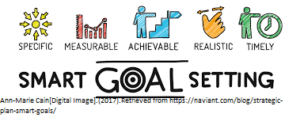Goals
Background
Setting goals is crucial for both nurses and students as it enables them to continuously develop their knowledge and skills that will help them to identify and evaluate their own performance in order to deliver excellent and quality care services. Nursing goals or objectives are often developed based on the SMART format. This is because SMART allows us to develop goals that are effective and concise (White, 2016). SMART is an acronym for “Specific, measurable, attainable, relevant and time-specific” goals. Setting SMART goals and integrating it into the clinical setting would provide the best results.
Importance of goal setting in nursing

Setting goals allows the individual to engage in professional development or learning in a systematic manner. It is a continuous process that includes reflecting own practice, identifying current learning needs, developing SMART learning goals or objectives to meet the learning needs, completing the set of activities and finally, evaluating the practices. This ensures the visible change in performance, based on future learning needs identified and the cycle continues (Stonehouse, 2017).

It is essential to understand why setting goals are important in nursing? It helps bring future goals into clear focus. It offers individuals with something to work towards, improve and change. Setting Clear and concise goals will allow nurses to take appropriate steps to achieve the intended outcome (White, 2016). Furthermore, it also promotes the skills and expertise of nurses which will help them to contribute towards the system in an effective manner.
Introduction to SMART acronym
A SMART goal is:
Specific – The goal is detailed and focus is clear.
Measurable – The goal is quantifiable, indicating that one can see the result.
Attainable – The goal is attainable based on skills, resources.
Relevant – The goal is applied to the current role and related with the responsibilities.
Time-specific – The goal is set to be met within a specific time limit.
Short term goal
Goal 1
Specific – I want to be able to demonstrate effective conflict management skills among nurses by June 2020.
Measurable – To successful resolve one conflict among nurses in the ward each month.
Attainable – To attend in-service talks or read books or articles that deals with managing conflicts among nurses.
Relevant - Frequent conflicts among nurses regarding rosters and assignments. It is the responsibility of senior staff nurses to deal with such issues.
Time specific - Met by June 2020
Goal 2
Specific – I want to improve my research skills.
Measurable – I want to write a concise, accurate and detailed research paper within 6 months.
Attainable – To attend courses related to research skills, read research textbooks and journals and to practice writing research papers.
Relevant – This will help as a nurse to write research papers and expand my knowledge on nursing.
Time-specific – Met by next 6 months
Long term goal
Goal 1
Specific – I want to an effective nursing leader within next 3 years.
Measurable – I will engage in leadership training and team handing to improve my overall skill.
Attainable – To lead a team of nurses in different nursing activities each month
Relevant – Improves my overall portfolio as an effective team leader and enables me to lead a group of nurses during challenging times.
Time-specific – Met within 3 years
Goal 2
Specific – I want to be able to identify ethical conflicts and apply ethical framework in the nursing environment to resolve these conflicts within next 3 years
Measurable – Attend courses that is related to ethical conflicts and read books on application of ethical framework in nursing fields.
Attainable – To apply ethical framework in case scenarios and subsequently progress into the clinical setting where appropriate.
Relevant – Improves my nursing ethics and moral value development.
Time-specific – Met by 3 years
References
Stonehouse, D. (2017). Understanding the nursing process. British Journal of Healthcare Assistants, 11(8), 388-391.
White, M. L. (2016). Collaborative Leadership in the Nursing Classroom: A Case Study Approach.
